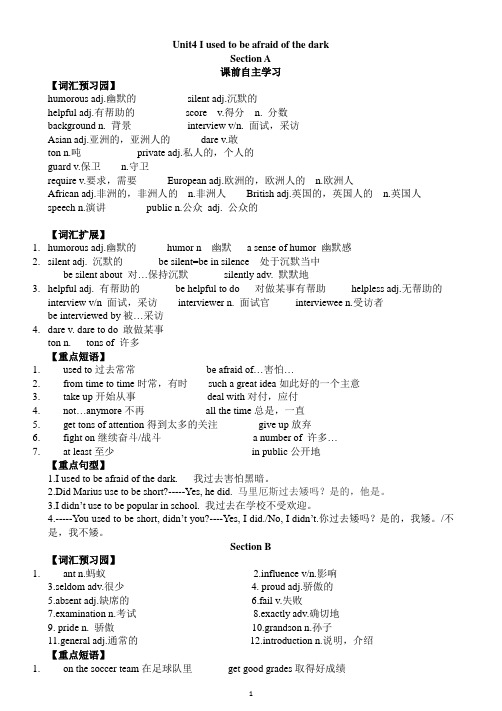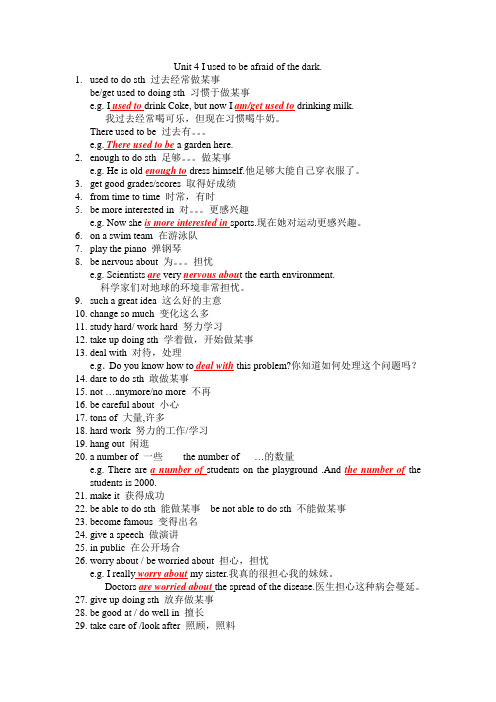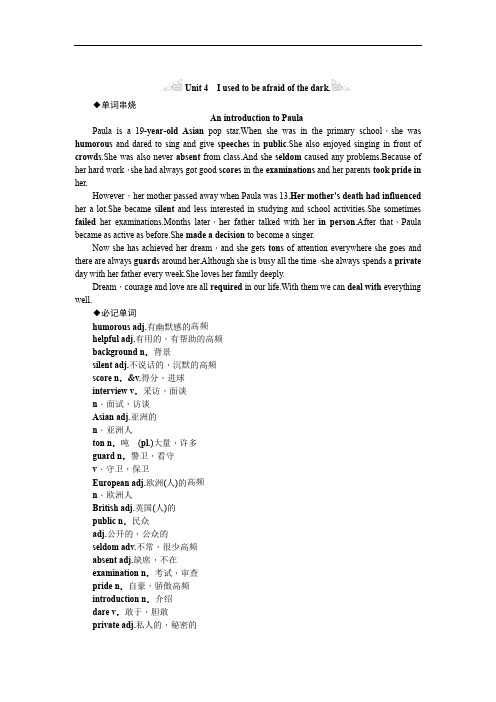Unit4 I used to be afraid of the dark第五课时
Unit 4 I used to be afraid of the dark.(讲义及作业)含答案

Unit 4 I used to be afraid of the dark. Words and Expressionshumorous /'hju:mərəs/ adj. 有幽默感的;滑稽有趣的silent /'saɪlənt/ adj.不说话的;沉默的helpful /'helpfl/ adj.有用的;有帮助的from time to time 时常;有时score /skɔ:(r)/ n.&v.得分;进球background /'bækgraʊnd/ n. 背景interview /'ɪntə(r)vju:/ v. 采访;面试n.面试;访谈Asian /'eɪʃn, 'eʒən/ adj.亚洲(人)的n.亚洲人deal /di:l/ v. (dealt /delt/, dealt) 对付;对待deal with 应对;处理shyness /'ʃaɪnəs/ n. 害羞;腼腆dare /deə/, /der/ v. 敢于;胆敢crowd /kraʊd/ n. 人群;观众ton /tʌn/ n. 吨;(pl.) 大量;许多private /'praɪvət/ adj. 私人的;私密的guard /gɑ:(r)d/ n. 警卫;看守v.守卫;保卫require /rɪ'kwaɪə(r)/ v. 需要;要求European /ˌjʊ(ə)rə'pi:ən/ adj. 欧洲(人)的n. 欧洲人African /'æfrɪkən/ adj. 非洲(人)的n. 非洲人British /'brɪtɪʃ/ adj.英国(人)的speech /spi:tʃ/ n. 讲话;发言public /'pʌblɪk/ n.民众adj. 公开的;公众的in public 公开地;在别人(尤指生人) 面前ant /ænt/ n. 蚂蚁insect /'ɪnsekt/ n. 昆虫seldom /'seldəm/ adv. 不常;很少influence /'ɪnfluəns/ v.&n.影响absent /'æbsənt/ adj.缺席;不在fail /feɪl/ v. 不及格;失败;未能(做到)examination /ɪgˌzæmɪ'neɪʃn/ n.考试;审查boarding /'bɔ:dɪŋ/ school 寄宿学校in person 亲身;亲自exactly /ɪg'zæktli/ adv. 确切地;精确地pride /praɪd/ n. 自豪;骄傲take pride in 为…感到自豪proud /praʊd/ adj. 自豪的;骄傲的be proud of 为…骄傲;感到自豪general /'dʒenrəl/ adj. 总的;普遍的;常规的n.将军introduction /ˌɪntrəˈdʌkʃn/ n. 介绍Paula /'pɔ:lə/ 葆拉(女名)Alfred /'ælfrɪd/ 艾尔弗雷德(男名)Billy /'bɪli/ 比利(男名)Candy /'kændi/ 坎迪(女名)Jerry /'dʒeri/ 杰里(男名);杰丽(女名) Emily /'emɪli/ 埃米莉(女名)Role-play the conversation.Alfred: This party is such a great idea!Gina: I agree. It’s been three years since we last saw our primary school classmates.Alfred: It’s interesting to see how people have changed.Gina: Billy has changed so much! He used to be so shy and quiet. Alfred: Yeah, his face always turned red when he talked to girls! Gina: I used to see him reading in the library every day.Alfred: That’s because he was a really good student. He studied hard and got good scores on his exams.Gina: Did he use to wear glasses?Alfred: Yes, and he used to be thin, too. But look how big andstrong he is now!Gina: He’s so popular now. Look at all the girls around him!Reading 1Read the article and identify the paragraphs in which thefollowing information appears. Number the information [1–3].____ how Candy’s li fe has changed____ Candy’s advice to young people____ Candy’s backgroundFrom Shy Girl to Pop Star1 For this month’s Young World magazine, I interviewed19-year-old Asian pop star Candy Wang. Candy told me that sheused to be really shy and took up singing to deal with hershyness. As she got better, she dared to sing in front of her class,and then for the whole school. Now she’s not shy anymore andloves singing in front of crowds.2 I asked Candy how life was different after she became famous.She explained that there are many good things, like being able totravel and meet new people all the time. “I didn’t use to bepopular in school, but now I get tons of attention everywhere Igo.” However, too much attention can also be a bad thing. “Ialways have to worry about how I appear to others, and I have tobe very careful about what I say or do. And I don’t have muchprivate time anymore. Hanging out with friends is almostimpossible for me now because there are always guards aroundme.”3 What does Candy have to say to all those young people whowant to become famous? “Well,” she begins slowly, “you haveto be prepared to give up your normal life. You can neverimagine how difficult the road to success is. Many times Ithought about giving up, but I fought on. You really require a lotof talent and hard work to succeed. Only a very small number ofpeople make it to the top.”3b Read the article again and complete the sentences about Candy.1.She used to be shy, but now she’s not shy ____________.2.She didn’t use to be ___________ in school, but now she getslots of attention.3.She used to ___________ with friends, but it is almostimpossible now.4.She didn’t use to ___________ how she appears to others, butnow she does.Grammar Focus重点句型:used to…过去常常……肯定句:I used to be short.否定句:I didn’t use to be popular in school.I usedn’t (used not) to be popular in school.疑问句:Did he use to wear glasses?—Yes, he did. / No, he didn’t.反意句:You used to be short, didn’t you?—Yes, I did. / No, I didn’t.Did she use to live in Shanghai?= Used she to live in Shanghai?Did you use to play the piano?= Used you to play the piano?—He used to drink milk, didn’t he?—Yes, he did.—No, he didn’t.—He used to drink milk, usedn’t he?—Yes, he did. / Yes, he used to.—No, he didn’t. / No, he usedn’t to.used to do sth. be used to (doing) sth. be used to do sth.She ______ live alone. But she ______ living alone because she feels lonely.A. used to; doesn’t used toB. is used to; was used toC. used to; is not used toD. was used to; doesn’t used to4a Write sentences about the past using used to.1.Grace / watch a lot of TV / watch a lot of moviesGrace used to watch a lot of TV. She didn’t use to watch a lot of movies.2.My mom / have curly hair / have straight hair____________________________________________________ __________________3.Jerry / read books on European history / read books on Africanculture____________________________________________________ __________________.4.Sandy / teach British English / teach American English____________________________________________________ __________________.Reading 2Read the passage and put the sentences [A-D] in the correctHe Studies Harder Than He Used toLi Wen is a normal 15-year-old boy from the countryside. He works very hard and does well in school. It is hard to believe that he used to have difficulties in school. When he was a little boy, he seldom caused any problems, and his family spent a lot of time together. ____________. His parents moved to the city to look for jobs, and his grandparents came to take care of him. But he missed his parents so much and he often felt lonely and unhappy.Li Wen’s unhappiness began to influence his schoolwork. He became less interested in studying. Sometimes he was absent from classes and he failed his examinations. Finally, Li Wen’s parents made the decision to send him to a boarding school. However, Li Wen was shy and was not able to make friends quickly in school. He found life there difficult. One day he told his teacher that he wanted to leave the school. _________ and she called his parents. She advised them to talk with their son in person. So his parents took a 24-hour train and a 5-hour bus ride to get to Li Wen’s school._____________. “It was exactly what I needed,” he said. “Now I understand that even though they are busy, they are always thinking of me. They take pride in everything good that I do.”After that, Li Wen’s parents hadmuch more communication withtheir son than they used to._____________. He becamemore outgoing and made somegood friends in school. He evenjoined the school basketball team and became active in many other activities. “I’m much happier now, and I work ever harder than I used to. I know my parents love me and they’re always proud of me,”says Li Wen. “It’s veryimportant for parents to be there for their children.”2e Complete the passage with the proper forms of the words and phrases in the box.Li Wen is a 15-year-old boy. He works hard and does well in school. It is hard to believe that he used to have difficulties in school. When his parents moved to the city to work, they could not be at home to _____________ him. So he became less interested in studying and _____________ classes. Then his parents ___________ to send him to a boarding school. He found life there difficult. One day he told his teacher he wanted to leave the school. His teacher advised his parents to talk with their son in person. This conversation ____________ his life. He realized that his parents would always love him, and they would _____________ everything good that he did. Now he is much happier and more outgoing than he used to be.3b Write about how you have changed. What did you use to be like? Which change is the most important one, and why?H ow I’ve Changed!My life has changed a lot in the last few years. I used to _______________________________________________________________________________ __________________.Now I’m_______________________________________________________ __________.The biggest change in my life was _________________________________________.This is the most important change because ______________________________________________________________________________________________ __________________.Self Check1 Fill in the blanks with the correct forms of the words in the1.The mother traveled for many hours to return home to talkto her child ______.2.He used to be a very quiet teenager. He remained _______most of the time and _______ talked to other people.3.If you are always _______ from class, you will _______ theexaminations.4.The teacher _______ helping his students win the Englishcompetition.5.Kate’s grandparents have had a great _______ on her.6.That British teacher is very _______. He always tells usinteresting jokes.7.People are usually _______ to give a generalself-introduction in a job _______.8.Tina played very well in the basketball game and herparents _______ her.2 What did you use to be like when you were in primaryschool? Complete these statements.I used to wear_______________________________________________________ ___.My hair used to be______________________________________________________.I used to watch_______________________________________________________ __.I used to play_______________________________________________________ ____.I used to be_______________________________________________________ _____.Exercises1. Candy told me that she ________ (以前) be really shy and________ (开始) singing to ________ (克服) her shyness.2. I ________ have much private time ________ (不再).3. She still plays the piano ________ (时常).4. It’s polite to keep our voice down ________.5. Wearing red can help you make a ________ (decide).6. 我爸爸过去常常开车上班,现在坐公交车了。
Unit4Iusedtobeafraidofthedark

Unit 4 I used to be afraid of the dark1. used to 过去曾经2. be afraid of the dark 惧怕黑暗4. get good scores取得好的分数5. deal with对付,应对6. get tons of attention得到大量的关注7. read books on European history 阅读有关欧洲历史的书8. African culture非洲文化9. be alone独处10. give a speech in public作一个公开演讲11. paint pictures画画12. be nervous about tests对考试感到紧张13. influence his way of thinking影响他的思维方式14. be proud of ./take pride in为…感到骄傲15. be absent from classes逃课16. fail the examinations 考试不及格17. make a decision 下决心18. talk with sb in person亲自找某人谈话19. to one’ surprise使某人惊讶的是20. feel good about oneself对自己充满信心21. a general self-introduction一个简要的自我介绍22. in the last few years在最近几年23. remain silent保持沉默24. have a great influence on sb对某人有很大的影响【重点知识】used to do sth 意为“过去常常做某事”,特指在过去经常发生的动作,而现在已不再发生,be used to do sth 表示“被用于做某事”,是被动结构,强调主语是动词use的承受者。
新人教版九年级英语Unit 4 I used to be afraid of the dark

Unit4 I used to be afraid of the darkSection A课前自主学习【词汇预习园】humorous adj.幽默的silent adj.沉默的helpful adj.有帮助的score v.得分n. 分数background n. 背景interview v/n. 面试,采访Asian adj.亚洲的,亚洲人的dare v.敢ton n.吨private adj.私人的,个人的guard v.保卫n.守卫require v.要求,需要European adj.欧洲的,欧洲人的n.欧洲人African adj.非洲的,非洲人的n.非洲人British adj.英国的,英国人的n.英国人speech n.演讲public n.公众adj. 公众的【词汇扩展】1.humorous adj.幽默的humor n 幽默 a sense of humor 幽默感2.silent adj. 沉默的be silent=be in silence 处于沉默当中be silent about 对…保持沉默silently adv. 默默地3.helpful adj. 有帮助的be helpful to do 对做某事有帮助helpless adj.无帮助的interview v/n 面试,采访interviewer n. 面试官interviewee n.受访者be interviewed by被…采访4.dare v. dare to do 敢做某事ton n. tons of 许多【重点短语】ed to过去常常be afraid of…害怕…2.from time to time时常,有时such a great idea如此好的一个主意3.take up开始从事deal with对付,应付4.not…anymore不再all the time总是,一直5.get tons of attention得到太多的关注give up放弃6.fight on继续奋斗/战斗 a number of 许多…7.at least至少in public公开地【重点句型】1.I used to be afraid of the dark. 我过去害怕黑暗。
Unit 4 I used to be afraid of the dark(第4课时)教学设计

Unit 4 I used to be afrd of the dark(第4课时)教学设计一. 教材分析《I used to be afrd of the dark》是人教版PEP小学英语第四册Unit 4的主题句,本课主要讲述过去和现在的对比。
教材内容贴近学生生活,易于激发学生的学习兴趣。
通过本课的学习,学生能够掌握一般过去时态,并能够运用句型“—Did you use to do sth? —Yes, I did./No, I didn’t.”进行问答。
二. 学情分析根据四年级学生的认知特点,他们已经具备了一定的英语听说能力,能够理解和运用一些简单的英语句型。
但部分学生对一般过去时态的掌握尚有困难,需要在教学中给予重点辅导。
学生在日常生活中对过去和现在的对比有丰富的经历,可以借助生活经验更好地理解和运用所学知识。
三. 教学目标1.知识目标:学生能够掌握一般过去时态,理解并运用句型“—Did youuse to do sth? —Yes, I did./No, I didn’t.”进行问答。
2.能力目标:学生能够在日常生活中运用所学知识进行交流,提高英语听说能力。
3.情感目标:通过对比过去和现在,学生能够珍惜现在的生活,积极面对未来。
四. 教学重难点1.重点:学生能够掌握一般过去时态,运用句型进行问答。
2.难点:学生能够灵活运用一般过去时态,表达自己的过去和现在的对比。
五. 教学方法采用情景教学法、交际法、任务型教学法等多种教学方法,激发学生的学习兴趣,提高学生的英语听说能力。
六. 教学准备1.教学课件:制作包含图片、动画等多媒体元素的教学课件,生动展示过去和现在的对比。
2.教学道具:准备一些与过去和现在相关的实物道具,如玩具、衣物等,方便学生直观感受。
3.练习题:设计一些练习题,用于巩固所学知识。
七. 教学过程1.导入(5分钟)利用课件展示一些过去和现在的对比图片,如玩具、衣物、交通工具等,引导学生谈论过去和现在的变化。
九年级-unit-4-I-used-to-be-afraid-of-the-dark-课文重难点讲解

Unit 4 I used to be afraid of the dark.Section A 课文重难点精讲精选【解析1】:1. use v.使用→useful adj. 有用的 use up 用完Eg: Studying English is__________(use).2. use sth to do sth 用某物做某事Eg:We use Internet __________(find) information.3. used to do sth 过去常常做某事,表示过去做过的事现在已经不做,只用于过去时态。
◆变成否定句或疑问句时要借助助动词didn’t/did【拓展】:1. 肯定形式:主+used to+do… Eg: I used to get up at six.2. 否定形式:主+ usedn’t /didn’t use +to do … Eg: He usedn’t to study hard.= He didn’t use to study hard.3. 疑问形式:① Used +主语+ to do sth … 答语: Yes, 主语+used to./ No, 主语+ usedn’t to② Did + 主语+ use + to do …. 答语: Yes,主语+ did./ No, 主语+ didn’tUsed he to go to school on foot= Did he use to go to school on foot4. 反意疑问句:①肯定句+ didn’t /usedn’t+ 主语 Eg: He used to be very rich, didn’t he/ usedn’t he②否定句+ did /used +主语 Eg: He didn’t use to smoke, did /used he练习:① My mother used_________(tell)us story when we were young. ( )② He used to ____short and ____ short hair when he was young. ( )A. have; beB. be; haveC. be; beD. have; have【辨析】:辨析:used to do something.,be used to do something.与be used to doing something.1. used to do sth. “过去常常做某事”(而现在已经不做了),表示过去习惯性、经常性的动作或状态,和现在对比,暗示现在不做了。
【人教版】2020九年级英语全册 Unit 4 I used to be afraid of the dark Section A

Unit 4 I used to be afraid of the dark. Section Athe morning.让孩子们小点声,保持安静。
②silent “声音极小的、沉默的、寡言的”。
如:John is a silent,thoughtful boy. 约瀚是个不爱讲话,喜欢思考的孩子。
The house was silent because everyone was asleep.房子里很安静,所有的人都睡着了。
3. She still plays the from time to time. 她依旧不时地弹奏。
from time to time 为介词短语,意为“时不时地”。
同义词组为sometimes,at time。
例如:The temper gets the best of him from time to time. 他有时控制不住自己的脾气。
From time to time he fired questions at me. 他不时向我提出许多问题。
归纳有关time的短语:on time准时;in time 及时;all the time一直;kill the time 消磨时间have a good time玩得开心;once upon a time 从前;很久很久以前4. It’s been three years since we last saw our primary school classmates.距离我们最后一次见到小学同学已经三年了。
(1)该句型是:It is(has been)+时间+since+持续性动词的过去时,表示“自从……以来到现在已有多久。
”例如: It has been quite some time since I was last in London.我上次离开伦敦至今颇有一段时间了。
还可用于句型:It was+时间+since+持续性动词的过去完成时,表示“从……到过去某时间点以来”。
Unit4Iusedtobeafraidofthedark

Unit 4 I used to be afraid of the dark.ed to do sth 过去经常做某事be/get used to doing sth 习惯于做某事e.g. I used to drink Coke, but now I am/get used to drinking milk.我过去经常喝可乐,但现在习惯喝牛奶。
There used to be 过去有。
e.g. There used to be a garden here.2.enough to do sth 足够。
做某事e.g. He is old enough to dress himself.他足够大能自己穿衣服了。
3.get good grades/scores 取得好成绩4.from time to time 时常,有时5.be more interested in 对。
更感兴趣e.g. Now she is more interested in sports.现在她对运动更感兴趣。
6.on a swim team 在游泳队7.play the piano 弹钢琴8.be nervous about 为。
担忧e.g. Scientists are very nervous abou t the earth environment.科学家们对地球的环境非常担忧。
9.such a great idea 这么好的主意10.change so much 变化这么多11.study hard/ work hard 努力学习12.take up doing sth 学着做,开始做某事13.deal with 对待,处理e.g.Do you know how to deal with this problem?你知道如何处理这个问题吗?14.dare to do sth 敢做某事15.not …anymore/no more 不再16.be careful about 小心17.tons of 大量,许多18.hard work 努力的工作/学习19.hang out 闲逛20.a number of 一些the number of …的数量e.g. There are a number of students on the playground .And the number of thestudents is 2000.21.make it 获得成功22.be able to do sth 能做某事be not able to do sth 不能做某事23.become famous 变得出名24.give a speech 做演讲25.in public 在公开场合26.worry about / be worried about 担心,担忧e.g. I really worry about my sister.我真的很担心我的妹妹。
Unit 4I used to be afraid of the dark

Unit 4I used to be afraid of the dark.◆单词串烧An introduction to PaulaPaula is a 19-year-old Asian pop star.When she was in the primary school,she was humorous and dared to sing and give speeches in public.She also enjoyed singing in front of crowds.She was also never absent from class.And she seldom caused any problems.Because of her hard work,she had always got good scores in the examinations and her parents took pride in her.However,her mother passed away when Paula was 13.Her mother's death had influenced her a lot.She became silent and less interested in studying and school activities.She sometimes failed her examinations.Months later,her father talked with her in person.After that,Paula became as active as before.She made a decision to become a singer.Now she has achieved her dream,and she gets tons of attention everywhere she goes and there are always guards around her.Although she is busy all the time,she always spends a private day with her father every week.She loves her family deeply.Dream,courage and love are all required in our life.With them we can deal with everything well.◆必记单词humorous adj.有幽默感的高频helpful adj.有用的,有帮助的高频background n.背景silent adj.不说话的,沉默的高频score n.&v.得分,进球interview v.采访,面谈n.面试,访谈Asian adj.亚洲的n.亚洲人ton n.吨(pl.)大量,许多guard n.警卫,看守v.守卫,保卫European adj.欧洲(人)的高频n.欧洲人British adj.英国(人)的public n.民众adj.公开的,公众的seldom adv.不常,很少高频absent adj.缺席,不在examination n.考试,审查pride n.自豪,骄傲高频introduction n.介绍dare v.敢于,胆敢private adj.私人的,秘密的require v.需要,要求African adj.非洲(人)的n.非洲人speech n.讲话,发言ant n.蚂蚁influence v.&n.影响fail v.不及格,失败,未能(做到)高频exactly adv.确切地,精确地general adj.总的,普遍的n.将军◆重点短语from time to time时常,有时高频deal with对待,对付高频take pride in为……感到自豪高频take up开始从事(某事)高频tons of许多,大量be absent from缺席even though即使高频be afraid of害怕in public公开地高频in person亲身,亲自高频be proud of为……骄傲高频all the time总是,一直hang out闲逛make a decision做决定高频used to过去常常◆词形变换humorous adj.→humor n.幽默高频helpful adj.→help v. & n.帮助,帮忙silent adj.→silence n.沉默高频Asian adj. & n.→Asia n.亚洲高频European adj. & n.→Europe n.欧洲高频African adj. & n.→Africa n.非洲高频British adj. & n.→Britain n.英国absent adj.→absence n.缺席exactly ad v.→exact adj.精确的pride n.→proud adj.骄傲的,自豪的高频introduction n.→introduce v.介绍◆重点句子1.She was never brave enough to ask questions.她从来不够勇敢地去问问题。
- 1、下载文档前请自行甄别文档内容的完整性,平台不提供额外的编辑、内容补充、找答案等附加服务。
- 2、"仅部分预览"的文档,不可在线预览部分如存在完整性等问题,可反馈申请退款(可完整预览的文档不适用该条件!)。
- 3、如文档侵犯您的权益,请联系客服反馈,我们会尽快为您处理(人工客服工作时间:9:00-18:30)。
Unit4 I used to be afraid of the dark
Exercise class
教学目标
1.词汇:tall/long fat(heavy)/thin straight/cure hair long/short hair
serious quiet silent outgoing humorous
active funny friendly (im)polite brove
helpful warm
from time to time时常,有时deal with对付,应
付in public公开的be proud of为骄傲,
感到自豪in person亲身,亲自take pride in为
感到自豪
2.句子:
(1)I used to be afraid of the dark
(2) It is hard to belive that he used to be a “problem
child” until a conversation with his parents influenced
his way of thinking.
(3) It’s very important for parents to be there for their children.
3.语法:一般过去时和一般现used to be/do过去常常
4.重难点:
(1)掌握used to be/do的用法
(2)区别并掌握used to be/do和be used to doing的用法
(3)反意疑问句的用法;反意疑问句的回答方法;巧记Enough 在句中的位置;too much much too 与
too many;
(4)in front of in与the front of
5.技能目标:能听懂Did you use to…?等含有used to的对话,完成听力任务;学会运用used to句型谈论自己与他人的过去的习惯、爱好及经常要做的事
6. 情感目标:同学们能描述过去和现在的变化(自身的有、缺点也不是一成不变的),学会彼此交流、自我检查、改进不足,不断完善自我并建立同学间的友谊。
教学过程:
Step1. self-check:
Step 2. the big exercise-book:
Step3. Summary
同学们自己要学会自己总结:
1.本节课我学到了什么?
2.学会了什么,还有哪些没有学会?
3.掌握了什么,还有哪些没有掌握?
Step4. homework:
1.复习今天所学的单词、词组、句型、知识点并预习明天的
词汇;
2.做大册子;
3.写作:我和我朋友的今昔对比。
